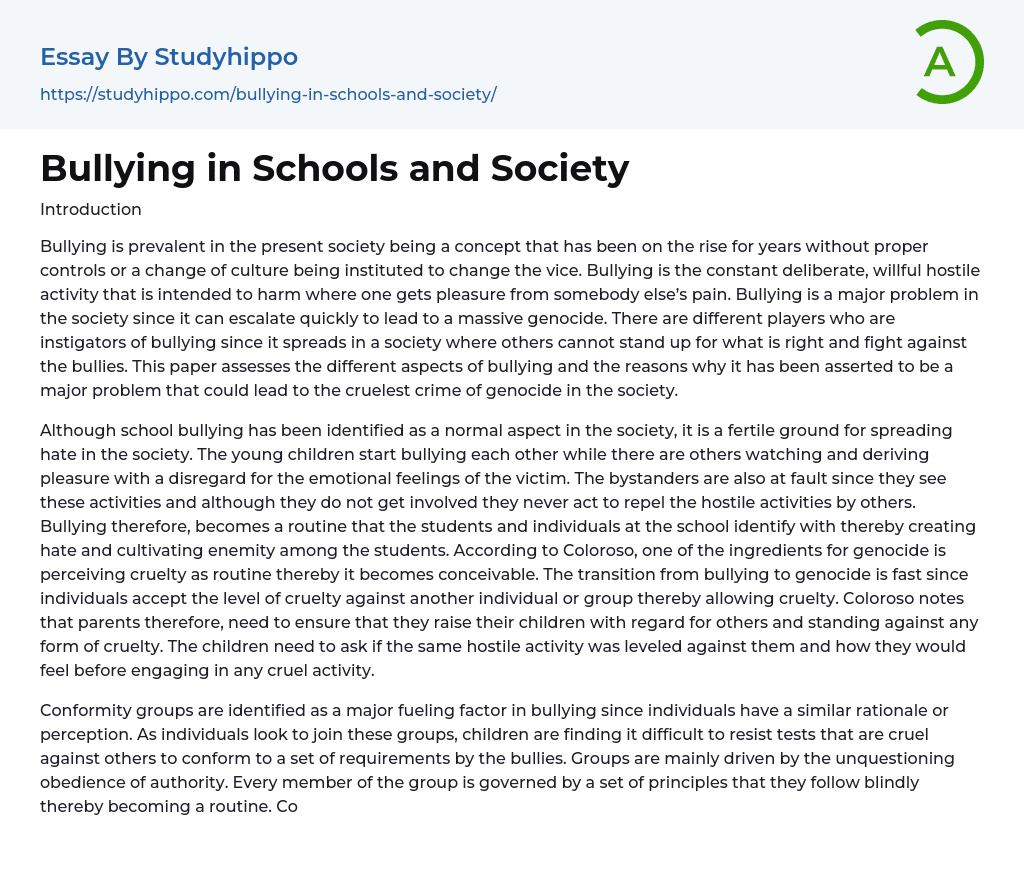Introduction
Bullying is a prevalent issue in today's society, with its prevalence growing over the years. Regrettably, inadequate measures or cultural changes have been implemented to tackle and counteract this problem.
Bullying is the deliberate and hostile act of intending to harm someone, deriving pleasure from their pain. It is a significant issue in society as it can quickly escalate and result in a massive genocide. Various individuals contribute to bullying, as it thrives in a community where bystanders fail to stand up against the bullies and uphold what is right. This paper examines the different facets of bullying and explores why it is considered a major problem that could potentially lead to the cruelest crime of genocide. While school bullying is often seen as commonplace, it provides fertile ground for cultivating hatred within society.
The act of bullying
...among young children is witnessed by others who derive pleasure from it, showing a disregard for the victim's emotions. The bystanders, although not actively participating, are also to blame as they fail to intervene and stop the hostile behavior. This pattern of bullying becomes a normal part of the school environment, fostering hatred and animosity among students. Coloroso argues that perceiving cruelty as routine is a key element in the development of genocide, as it makes such atrocities seem possible. The transition from bullying to genocide happens quickly when individuals accept and allow cruelty towards others or a particular group.
Coloroso emphasizes the importance of parents instilling empathy and standing up against cruelty in their children. To prevent engaging in harmful acts, children should consider how they would feel if they were on the receiving end of such actions. Bullyin
is often fueled by conformity groups, where individuals share a similar mindset. Joining these groups poses challenges for children, as they may be pressured to participate in acts of cruelty to meet the group's expectations. These groups are primarily driven by blind obedience to authority.
Every member of the group blindly follows a set of principles, creating a routine. Coloroso suggests that children should question the norm and form their own opinion instead of blindly conforming to what others see as normal. She advises parents to empower their children to question various models and identify the best fit based on their own analysis. Coloroso identifies unquestioning obedience to authority as a significant factor that can escalate bullying to the level of genocide in society.
The escalation of bullying to genocide by conformity groups is a result of dehumanizing individuals. When one person refers to another as an object or an animal, disregarding their emotions, it fosters a culture of hatred and enables severe acts of violence. These groups share the belief that the victims are not human beings but rather a problem, a nuisance, or some other derogatory label, thus justifying their elimination. Coloroso emphasizes that dehumanization allows bullies to act without guilt and persuades others to follow suit.
In summary, society must alter its perspective on bullying and unite against it. It is crucial for everyone to step forward and oppose all forms of bullying. This is necessary to ensure that society raises a generation that recognizes the power of individuals in shaping the world. Each person must take a personal stand, even if it is unpopular, as long as it is just.




